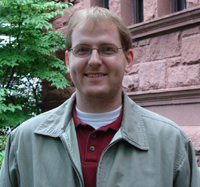Professor Jeffrey R. McCutcheon
The MIT Technology Review article A Low-Energy Water Purifier: A Yale spinoff hopes to solve the big problem with desalination said
“Access to clean water is severely limited in many parts of the world, and while desalination plants can separate freshwater from sea and brackish water, they typically require large amounts of electricity or heat to do so. This has prevented desalination from being economically viable in many poorer cities and countries.A Yale University spinoff called Oasys is driving one effort to change all this. Professor Menachem Elimelech and graduate students Robert McGinnis and Jeffrey McCutcheon have developed a novel desalination device that reduces the energy needed to purify water to one-tenth of that required by conventional systems.
The most common approach to desalination is currently reverse osmosis, and the market for this technology is expected to grow at a rate of 10 percent per year. Reverse osmosis involves forcing a solution through a semipermeable membrane using hydraulic pressure or thermal evaporation. The energy required to do this has spawned new thinking and innovation on lower-energy purification technologies. ‘The primary driver behind this technology is to get at the heart of the problem of energy cost,’ says Aaron Mandell, CEO of Oasys.
The company is using what it calls engineered osmosis. Unlike conventional desalination systems, the Oasys system establishes an osmotic pressure gradient instead of using pressure or heat to force water through a purifying membrane. The approach exploits the fact that water naturally flows from a dilute region to one that’s more concentrated when the two solutions are separated by a semipermeable material, thereby saving the energy normally needed to drive the process.”
Jeffrey R. McCutcheon, Ph.D. is Associate Professor of Chemical and Environmental engineering at the University of Connecticut. His research efforts focus on novel filtration techniques for water desalination.
Jeff earned his B.S. in chemical engineering from the University of Dayton in 2002. As an undergraduate, he participated in cooperative education programs at Wright Patterson Air Force Base and YSI, Inc. and contributed to work on thin film tribology and characterization, biosensors for glucose measurement, and sensors for monitoring water quality.
After completing his undergraduate studies, he attended graduate school at Yale University. He earned his M.S. in chemical engineering in 2003, conducting semester long projects in carbon nanotube synthesis and the removal of endocrine disrupting chemicals using nanofiltration membranes. He earned his Ph.D. at Yale in 2007. His thesis research involved improving the efficiency of the ammonia-carbon dioxide forward osmosis desalination process.
Jeff’s research interests also include osmotic power generation, and he holds a patent in this area. After finishing his Ph.D., he did postdoctoral research at Stony Brook University on electrospun nanofiber webs for use as substrates for water filtration membranes. He also led the research staff of a company that commercialized this technology.
He coauthored The Ammonia-Carbon Dioxide Forward Osmosis Process, Influence of concentrative and dilutive internal concentration polarization on flux behavior in forward osmosis, Desalination by Ammonia-Carbon Dioxide Forward Osmosis: Influence of Draw and Feed Solution Concentrations on Process Performance, Internal concentration polarization in forward osmosis: role of membrane orientation, A Novel Ammonia-Carbon Dioxide Forward (Direct) Osmosis Desalination Process, and The role of endocrine disruptors in water recycling: risk or mania?
Jeff has eight journal publications and seventeen conference proceedings have been based on his work. He is also a member of the American Institute of Chemical Engineers, the American Chemical Society, and the North American Membrane Society.
Read his LinkedIn profile.
